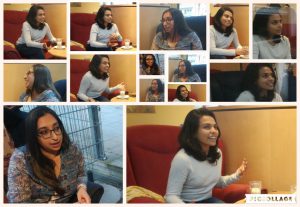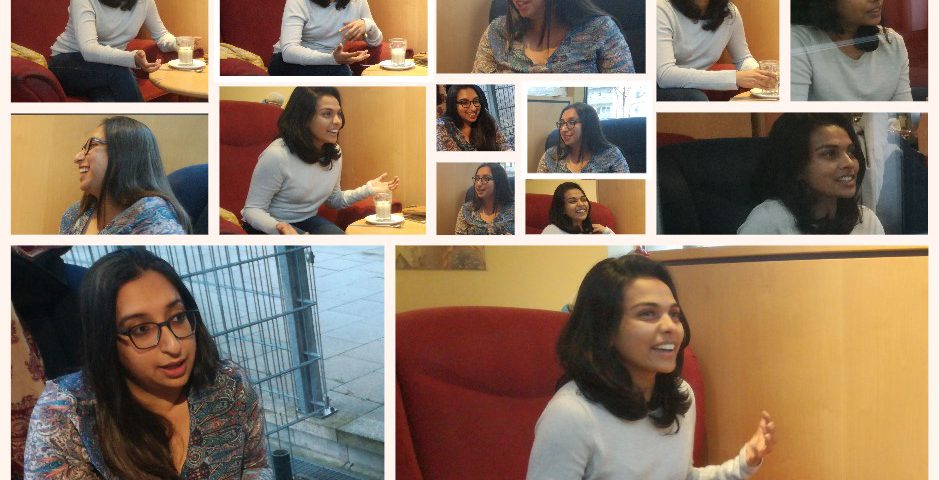Change happens whether you realize it or not, whether you want it or not. Most people go through life not realizing what their everyday situations are doing to them, how they interact with their environment and with themselves day after day. Some other people, however, are a lot more in control of their direction of change. These are the kind of people who can reflect best on their growth process. This post is an interview with one such person, my dear friend and (until recently) colleague Gayatri Salunkhe.
Divya: Hi Gayatri, thanks for joining us! Would you like to start off by telling us how you landed up starting your PhD in 2013?
Gayatri: Well, it was actually quite a straightforward road for me. After my Bachelor’s and Master’s in Psychology, I realized I didn’t quite feel ready to start off as a clinical practitioner. I wanted to remain a student and keep learning. My Master’s thesis had given me a glimpse into research and the prospect of a PhD sounded great. I was offered to do a PhD in Germany and I thought to myself “Never been there but sounds fun!”
Divya: How did your PhD start off?
Gayatri: Almost like a relationship that I jumped right into. It started off with a puppy love phase. At the start of my PhD, I still viewed things as I did during my Master’s thesis – that I have a question I find interesting and want to address, find answers to and assemble together on paper. And be like “Ta da! That’s my thesis!” Now, I think it was pretty naïve of me to expect that. The fag end of the puppy love phase came with the realization that unstructured PhDs, as is mine, can be very open-ended and demanding of skills well beyond the scope of your field.
Divya: You say you started off with a puppy love phase. How would you describe this phase?
Gayatri: It’s the excitement of this whole new thing you’re venturing into. Like a new relationship. You’re positive and admiring your choice with rose-tinted glasses. Then, you’re slowly exposed to some difficulties along the way – but you don’t want to accept these ‘flaws’ because you’re adamant that everything about your professional choice is perfect. That’s the romantic vibe that I carried for, let’s say, the first six months to a year. Then, I quickly realized that I’ve got a long path of growth in front of me.
Divya: This PhD-relationship is such an apt analogy!
Divya: I’d quickly like to give the readers here an overview of your problems in the early stages. When you came to Germany, you didn’t have a lab with the technical setup to just start running your experiments, your broader study was not fixed although you came here thinking you had a project in hand, and your experiments were finalized only after several rounds of trial and error during the first year. Any other major thing that happened?
Gayatri: I came here – a freshly baked Master in clinical neuro-psychology – but for a good year or two, my work was hardly related to psychology. To top it off, I barely had any interactions with people at work as I spent most days figuring my way around machines or software in the lab. My idea of science was far different from what my PhD expected of me back then. And although this technical stuff was only to get the lab all set up, it was long trying period and I was missing everything that I thought I jumped into this for.
Divya: Would you now change something about the way you dealt with things at the start of your PhD?
Gayatri: Yes! Even though I had several hints early on that I wasn’t enjoying the technical aspects of my research, I neither accepted nor expressed this. I just worked hard and struggled alone. Today, I’d probably do things differently: I’d pause and reassess things every couple of weeks, months and years. And I’d ask myself whether I’m happy with my progress not only as a professional but also, at a personal level. I still don’t think I would have quit, but I would voice my difficulties to find support or to perhaps even alter my project to fit my interests. Basically, I wouldn’t sweat over proving my abilities, I’d work smarter instead of only harder and demand support whenever needed.
Divya: What was stopping you from doing this earlier?
I didn’t voice myself or seek help because I wanted to prove, partly to others but mostly to myself, that I can overcome everything all by myself. These behaviours were somewhat supported by my Indian background in which students play a rather meek role before teachers. Today, I still enjoy a good challenge but I’ve learned a couple of things over time. Firstly, you have to pick your battles. Secondly, asking for help is not weakness. In fact, it’s proactive and, in Germany, even admired by superiors if you can iterate how support should be provided to you.
Divya: We’ve spoken about your experiences and realizations at the beginning of your PhD. When does this romanticized ‘puppy love phase’ start to come to an end?
Gayatri: Like in every relationship, time fades every form of puppy love. At some point, you start thinking to yourself, ‘Am I just this giggly, in-love girlfriend or is this really the perfect thing for me?’ You start thinking of work-life balance again. My personal life in the first year, the puppy love stage, was terrible because I…
Divya: You gave your relationship your all!
Gayatri: Exactly! You start meeting your friends lesser, forget you ever had hobbies – it’s all about the relationship! But then you have those bad days in the lab where nothing works. Abuses flying at the computer. Then you just have to come to eye-level, you and your Partner, the PhD. And then everything sobers down on that front.

Divya: Would you like to reflect a bit on your work-life balance throughout the PhD?
Gayatri: Right from the start, it’s been important to me to have some good friends around. Thankfully, I’ve managed to find these in a new country and they’ve been a real source of strength. But there were several periods when I didn’t quite manage to maintain a wholesome life outside work. Luckily, along the course of my PhD, I’ve learned to structure myself better. As a PhD project grows, you need to be super-organized and make sure nothing is slipping away. I’ve learnt how to have a good overview on everything – every aspect of my project including the fun and not-so-fun parts, basic personal life stuff like the next doctor’s appointment, or calling my parents; just making time for all the little things that can be put off easily. The management skills I learnt in my PhD have also helped me ensure that I’m not working at the cost of my private life.
Divya: That sounds like quite an achievement!
Gayatri: Yes, but there is still scope for improvement. For example, I feel like my PhD took away my discipline towards sports. I often hear people give up on their hobbies as they get older, saying ‘Work gives me no time for sports’. Sadly, over the past few years, I’ve fallen into this category as well! And I realize that life demands changes as career-oriented professionals, but I also know that I can’t count on having time but making time for things that matter.
(Note to readers: till before starting her PhD, Gayatri was an avid rugby and football player having also represented India at national and international level tournaments.)
Divya: I see you already making steps towards this. All the best!
Divya: Where do you stand with your PhD-relationship now? Is the relationship ending? Is it an open relationship?
Gayatri: I suppose it was an open relationship last year, when I was flirting around with; and became serious about another branch within Psychology – Global Mental Health. Recently, I found a wonderful job opportunity to continue to grow in that topic! This professional diversion is slowing bringing the relationship with my PhD to an end. But I just see this “break up” as healthy –I’m walking away a researcher. And those PhD skills will come with me.
Divya: Would you like to briefly tell our readers about why you’re ‘transitioning’ into another field?
Gayatri: I’ve been working now for over a year, voluntarily and in my extra time, on a – project in Global Mental Health. The reason I sought this topic is that it is interdisciplinary, highly application-oriented and accounts for cultural aspects of mental health issues – all very fitting to my interests and exactly the aspects I was missing in my rather-theoretical PhD. The experiences of working in this new topic over the last year served as a trial run. This time around, I feel more experienced and aware of what I’m getting into. My motivations are clearer and, there is far more scrutiny accompanying this new puppy love.
Divya: You’re making this transition without having finished your PhD. Most people start looking for jobs when they know an end date to their PhD – a submission date, a defence date etc. You’ve made an unconventional decision to not wait. Why is that?
Gayatri: Of course, for a long time, I was thinking in the ‘traditional’ way and postponed the idea of planning for my future until after my PhD would be done. But when I realized that my current specialization wouldn’t be one for the long-run, the hunt for another, more-fitting prospect began. Exploring new avenues alongside a PhD was fun and made me less scared of the idea of switching professional lines. The reason I am happy to ‘already’ take on the new job is, firstly, because my PhD is now near-finish, but more importantly, because I don’t want to postpone an opportunity that I’m already so excited to have found!
Divya: So this new professional line that you’re transitioning into, is this still a relationship? Is it just a matured version of your PhD, or is it a part of life not bound to you so much?
Gayatri: As much as I want a work-life balance, my work has always been and continues to be relationship-like for me given the significant impact it has on me and my wellbeing. This transition and all the circumstances leading up to it have given me the confidence to say that if I have to switch professional lines again in the future, once or multiple times, I would not be scared of that. I would never see this relationship and potential future relationships as a loss. Rather, there’s a lot I can gain out of each one. I’m quite excited to learn as much as I can from whatever I am doing and to walk around as an enterprise of various experiences with, hopefully, a lot to offer.
Divya: Well put! Last question then, if you could go back in time and give advice to your younger self in the last 5 years, what time point would that be and what advice would you give, if at all!
Gayatri: I don’t want to look back, but now that you asked me this question, I feel like I want to stop even before I commence with my new ventures and remind myself of how far I’ve come, how much more I still want to do and the skills and methods that I can use to get there.

You inspire me!